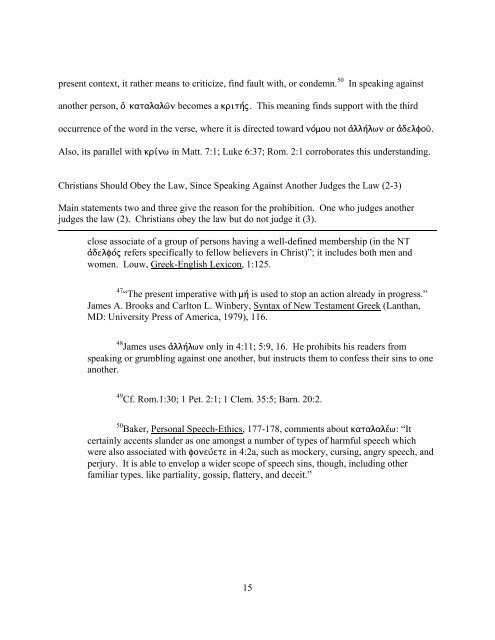Verba Christi in James: An Exegesis of James 4:11-12; 5:12 - Lorin
Verba Christi in James: An Exegesis of James 4:11-12; 5:12 - Lorin
Verba Christi in James: An Exegesis of James 4:11-12; 5:12 - Lorin
You also want an ePaper? Increase the reach of your titles
YUMPU automatically turns print PDFs into web optimized ePapers that Google loves.
present context, it rather means to criticize, f<strong>in</strong>d fault with, or condemn. 50 In speak<strong>in</strong>g aga<strong>in</strong>st<br />
another person, o& katalalw'n becomes a krithv". This mean<strong>in</strong>g f<strong>in</strong>ds support with the third<br />
occurrence <strong>of</strong> the word <strong>in</strong> the verse, where it is directed toward novmou not a*llhvlwn or a*delfou'.<br />
Also, its parallel with krivnw <strong>in</strong> Matt. 7:1; Luke 6:37; Rom. 2:1 corroborates this understand<strong>in</strong>g.<br />
<strong>Christi</strong>ans Should Obey the Law, S<strong>in</strong>ce Speak<strong>in</strong>g Aga<strong>in</strong>st <strong>An</strong>other Judges the Law (2-3)<br />
Ma<strong>in</strong> statements two and three give the reason for the prohibition. One who judges another<br />
judges the law (2). <strong>Christi</strong>ans obey the law but do not judge it (3).<br />
close associate <strong>of</strong> a group <strong>of</strong> persons hav<strong>in</strong>g a well-def<strong>in</strong>ed membership (<strong>in</strong> the NT<br />
a*delfov" refers specifically to fellow believers <strong>in</strong> Christ)”; it <strong>in</strong>cludes both men and<br />
women. Louw, Greek-English Lexicon, 1:<strong>12</strong>5.<br />
47 “The present imperative with mhv is used to stop an action already <strong>in</strong> progress.”<br />
<strong>James</strong> A. Brooks and Carlton L. W<strong>in</strong>bery, Syntax <strong>of</strong> New Testament Greek (Lanthan,<br />
MD: University Press <strong>of</strong> America, 1979), <strong>11</strong>6.<br />
48 <strong>James</strong> uses a*llhvlwn only <strong>in</strong> 4:<strong>11</strong>; 5:9, 16. He prohibits his readers from<br />
speak<strong>in</strong>g or grumbl<strong>in</strong>g aga<strong>in</strong>st one another, but <strong>in</strong>structs them to confess their s<strong>in</strong>s to one<br />
another.<br />
49 Cf. Rom.1:30; 1 Pet. 2:1; 1 Clem. 35:5; Barn. 20:2.<br />
50 Baker, Personal Speech-Ethics, 177-178, comments about katalalevw: “It<br />
certa<strong>in</strong>ly accents slander as one amongst a number <strong>of</strong> types <strong>of</strong> harmful speech which<br />
were also associated with foneuvete <strong>in</strong> 4:2a, such as mockery, curs<strong>in</strong>g, angry speech, and<br />
perjury. It is able to envelop a wider scope <strong>of</strong> speech s<strong>in</strong>s, though, <strong>in</strong>clud<strong>in</strong>g other<br />
familiar types. like partiality, gossip, flattery, and deceit.”<br />
15

















